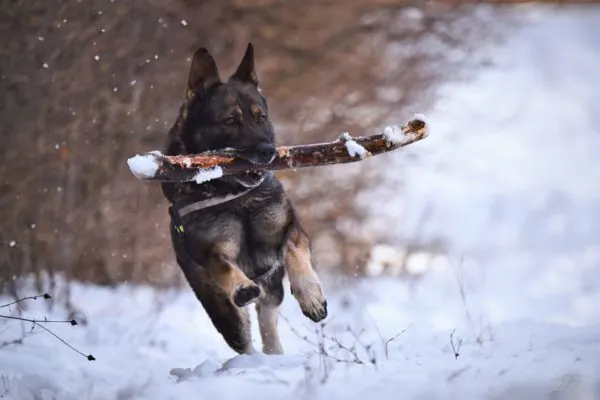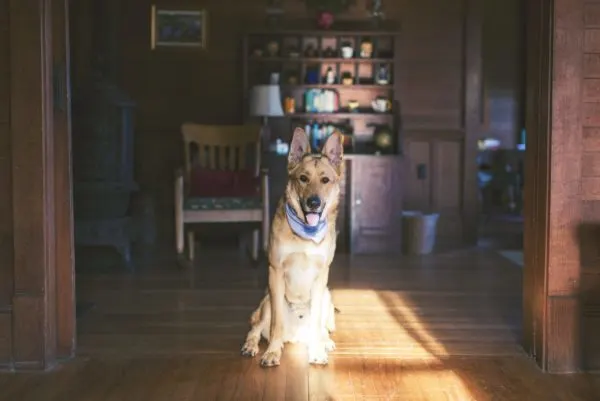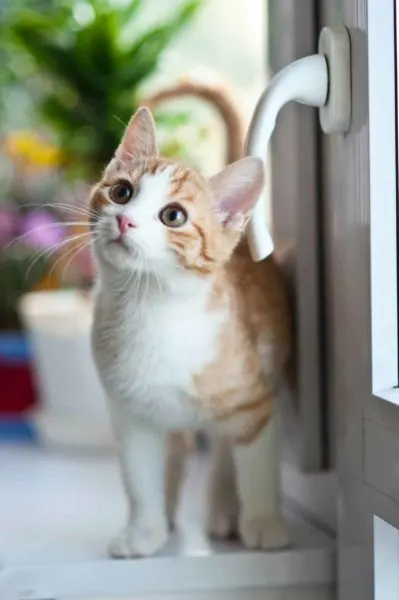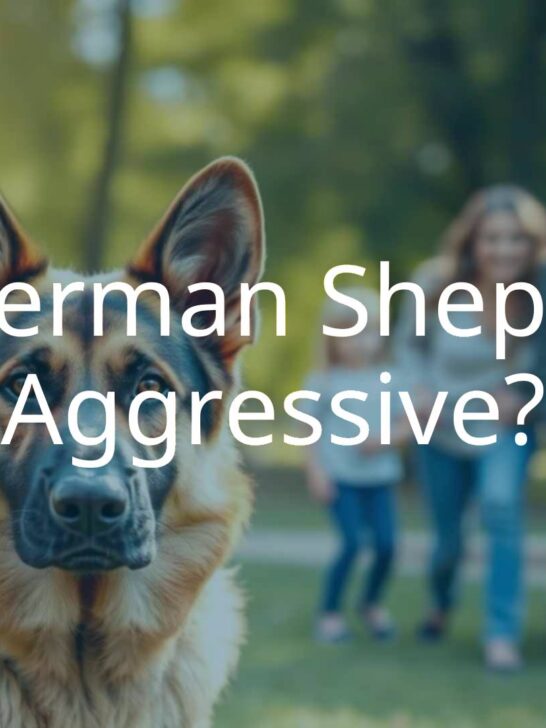Do German Shepherds Get Along With Cats? Help a Cat & GSD Become Friends!
German shepherds are big dogs, and cats are fairly small animals. While both are great pets to have on their own, living together is an entirely different story.
Whether you’re a cat owner or a dog owner, you might be worried about combining feline instincts with the rambunctious energy of a German Shepherd.
Caution is certainly merited; GSDs are big enough to seriously injure a cat if something goes wrong.
Still, if you approach the situation with the right attitude, your two animals can become the best of friends. There are plenty of German Shepherds who love the cats in their home.
So, do German Shepherds get along with cats? The answer is yes, but only if they are properly introduced.
Both the GSD and the cat need proper training to remain calm and tolerable of each other.
But please keep in mind that every dog is different, and the way your dog reacts to any situation will have a lot to do with your attitude as its owner.
If you remain calm when your dog is introduced to a cat, it’s far less likely to get overexcited and misbehave.
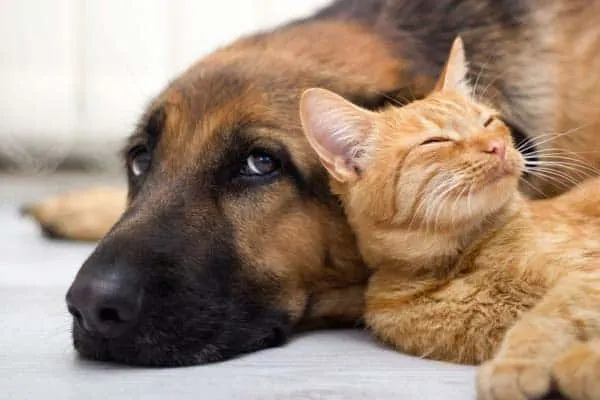
Are German Shepherds Good With Cats?
The ‘too long, didn’t read’ answer is that yes they can be, but several factors will influence the relationship between a GSD and a cat. Upbringing, timing, training, and socialization will all be a part of the equation.
Maybe most importantly, each pet’s individual personality will also influence the connection.
But this will more so impact how long it takes until they tolerate each other and how well they get along, rather than if they can get along at all.
But rest assured that there are easy processes that can be followed to ensure these two animals become the best of friends that are even fiercely protective of one another.
Why Do German Shepherds Chase Cats?
Dogs like to chase things. Many dogs run after squirrels, rabbits, and other forms of domestic wildlife.
Dogs also like to fetch tennis balls and chase lures to exercise this natural instinct.
All dogs have a prey drive. According to Jean Marie Bauhaus of Hill’s, this prey drive can take several different forms depending on the way the dog was bred.
German shepherds are herding dogs. German Shepherd Rescue Elite notes that the breed was formally created in the late 1800s.
German Shepherds are all descended from a particularly noble sheepherding dog named Hektor.
Herding dogs have been bred to give chase as a response to their prey drive. This behavior is useful for rounding up sheep, chickens, and any other farm animal that might need to be wrangled.
When a German Shepherd meets a cat, his initial reaction will be that of any dog: curiosity, excitement, or confusion.
However, most cats are extremely skittish, and they don’t tend to react well to excited dogs. When a cat meets a German Shepherd, she’s likely to run away.
If a cat runs, a German Shepherd’s natural instincts will encourage him to give chase. Whether the German Shepherd gives into these instincts depends on the dog’s training and temperament.
Should You Get a German Shepherd if You Have a Cat?
We recommend that you consider the temperament of your existing pet before you bring another dog or cat into your home.
You know your pets better than anyone; only you can decide whether a new animal is a good idea.
Some pets have open, friendly demeanors. If your cat is normally relaxed around humans and dogs, they are more likely to give a German Shepherd puppy a chance.
On the other hand, a cat who is usually skittish and aloof will probably not do well with a new family friend.
A pet’s level of socialization is also important. German shepherds who spend their time alone won’t react as well as dogs who spend all of their time around humans and other animals.
Consider whether your current pet shows territorial instincts, an aggressive prey drive, or dominant behaviors.
Pets who like to be in charge of their environment have a tough time adjusting to new family members.
Even if your pet shows these behaviors, you still might be able to adopt another cat or dog.
Be aware of your pet’s personality before you make your decision; if you want to adopt another animal anyway, be prepared to mitigate your original pet’s response.
According to Michele Welton, dog trainer and behavioral consultant, there are two main types of German Shepherds: show dogs and working dogs.
German Shepherds bred for the show can be skittish, but they have a more gentle temperament overall. German Shepherds bred to be working dogs have energetic but obedient temperaments.
If you already have a cat, look for a German Shepherd with a mellow personality.
Avoid dogs bred for high-stress situations, and instead find a breeder who specializes in dogs with family temperaments.
How Do You Train a German Shepherd to Get Along with Cats?
If possible, start training your German Shepherd to be comfortable with cats while he’s still a puppy.
The lessons that a creature learns during the early months of their life will always feel more natural to them; this is true for both dogs and cats.
You will have an easier time training your German Shepherd if you have a volunteer cat that is already comfortable with dogs.
Your puppy will be learning to control his or her excitement; this is more difficult if the other animal is stressed out.
Teach Your Dog to Ignore Cats
We recommend teaching your dog to ignore cats. You can do this by capturing your dog’s attention while a cat is in the room.
Start by placing your cat in a pet carrier. Bring your dog into the room, and let them sniff the carrier. After a moment, call your dog away for treats and direct its attention.
Continue to play with your dog while the cat is safely crated in the room. If your dog tries to investigate the carrier, block their access, or distract them again.
Whenever your dog ignores the cat and pays attention to you, reinforce this behavior with treats and praise.
After a few successful ignore sessions, put a leash on your dog and let the cat out of the carrier. Continue to reinforce ignoring the cat; don’t let your dog get up to investigate.
Eventually, you should be able to let your dog off-leash and maintain their full attention while a cat is in the room.
This skill is useful for other situations, too; try keeping your dog’s attention around busy traffic or in crowded public areas.
Teach Your Dog to Respect Cats
Once your dog knows the ignore skill, you can also teach them to wait patiently and let a cat approach them. Put your dog on a leash, and bring a cat in a carrier into the room.
Ask your dog to lie down and stay. They should already be comfortable with this command before you bring a cat into the situation.
If your dog lunges at the cat, say no. Correct their behavior until they remain still.
Once your dog has shown that he can stay quiet around the kitty, let the cat out of the carrier. Do not let yourself become tense; your dog will react to your emotions.
Keep your dog lying down while the cat explores the room. If you stay patient and relaxed, your dog will follow suit.
Eventually, the cat may feel like approaching your dog; keep your dog calm for the entire experience.
Don’t forget to reward your pup for good behavior. Once the cat is put away, let the energy rise again with treats and playtime.
Try asking your dog to lie down every time they see a cat. You want your German Shepherd to automatically relax and assume a non-threatening position whenever they encounter a feline.
How Do You Train Cats to Get Along with German Shepherds?
German shepherds usually only chase cats who run. If you can help your cat relax around the dog, you can prevent most chasing situations.
Your cat will probably never get along with all German Shepherds, but you can train them to be comfortable around one specific animal.
Try to understand how stressful this situation is from your cat’s point of view.
It can take weeks or months for a dog and a cat to get used to each other. Don’t expect instant results, and be very patient with your two pets.
Start by Introducing Scents
Keep your two pets separate from each other for the first day or two. If they’ve already had a bad introduction, give them a few days or even weeks to cool off and forget about the incident.
Remember to spend time with each pet individually; they shouldn’t feel like you love the other animal more.
Next, introduce your cat to the German Shepherd’s scent. Take a towel or a blanket that the dog has interacted with, and bring it into the cat’s space.
Your cat will slowly become comfortable with the dog’s presence in their home. You may also want to bring the cat’s scent into the dog’s environment.
Rosemary recommends feeding both pets while they’re on other sides of the same door. This lets them feel comfortable in each other’s presence without exposing them to direct interaction.
Introduce the Pets Slowly
When you haven’t noticed any barking, hissing, or stress from either pet in a few days, it’s time to try an introduction.
Follow the German Shepherd training steps to make sure that your puppy doesn’t scare your cat when they first meet.
Keep the German shepherd on a leash while you let your cat explore the room. Don’t let yourself become stressed; act like everything is normal, and take steps to distract the dog.
Eventually, your cat may choose to approach the dog. If you’ve been working with your German Shepherd, they should be able to contain their excitement.
Hissing, barking, and lunging are all signs that you should break the session and try again another day.
The goal is to let your cat become comfortable around the new family member.
Actual results will vary based on your cat; give them plenty of room to move around, and let them introduce themselves to the dog at their own pace.
Try These Tips to Prevent Kitty Conflicts
Your end goal is to be able to leave your cat and German Shepherd at home while you go out for the day.
Even if you trust the two of them, you should still take steps to keep the environment peaceful and safe.
Make sure that your pets have avenues to get away from each other.
Cats need access to high areas and safe rooms where the dog can’t get to. Dogs need backyards, crates, and other areas that are distinctly theirs.
Both pets should always be able to leave a stressful situation at a moment’s notice. Leave bedroom and bathroom doors open if you won’t be at home. You can also isolate one pet while you’re gone.
Use plenty of treats to help both animals relax. Good food creates positive associations.
If necessary, feed your pets on opposite sides of the same room.
Some cats do not relax inside carriers. Try using a baby gate to separate the two animals.
Remember to keep the German Shepherd on a leash until they both calm down.
Supervise all interactions between the dog and the cat for the first few months. Monitor stress levels, and casually end playtime if it gets too rough.
Be careful about how you translate your pet’s emotions. Always assume that your dog is afraid instead of aggressive; if he acts jumpy or upset, take steps to calm him down.
Watch a German Shepherd Become Friends with a Cat
This video of an adult German Shepherd and a new kitten showcases perfect pet introduction tactics. In this case, a kitten is being introduced to a German Shepherd’s home.
Because this is the dog’s environment, he is allowed to roam free while the cat remains in a carrier. Once the dog relaxes, he is carefully supervised as he introduces himself to the kitten.
These pet owners use treats to reward appropriate reactions, and the dog is continually praised for his good behavior. This leads to positive feelings and a sense of confidence around the new kitten.
Eventually, the dog and the cat start playing with each other. The young kitten doesn’t have a reason to be afraid of the dog, and the dog realizes that the cat is not a threat.
At some point, they even engage in play chasing; this behavior is not dangerous, but it should still be supervised. Trust your instincts – you will know if a situation is tense instead of playful.
Remember to show respect to the animal who currently lives in your home.
The older pet will always have a harder time acclimating to the situation; puppies and kittens aren’t usually afraid of new animals unless they’ve had a bad experience.
Above all, be patient with your furry friends. Be willing to wait months for tensions to truly dissipate.
If you maintain a positive attitude and handle the introductions well, your pets will learn to tolerate each other. They might even become best friends.















